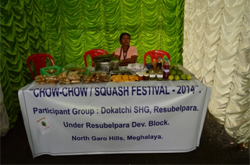
Meghalaya’s first “Piskot Festival 2014″ was held on Wednesday at the All Saints Hall. Organised by the State Institute of Rural Development (SIRD) in collaboration with the Meghalaya Basin Development Authority (MBDA), the event was held with the principle focus of popularising the humble Piskot (Squash) vegetable or Chow Chow as it is known in Latin America where it originated. Inaugurating the event Chief Secretary to the Government of Meghalaya, Mr PBO Warjri, encouraged the Piskot farmer to take advantage of the technical and marketing assistance given by the Government to add value to Piskot.
Mr. K. N. Kumar, Principal Secretary Community & Rural Development while welcoming the farmers to the festival said Piskot may be the poor man’s vegetable in Meghalaya but outside the State it is part of the rich person’s diet, selling at Rs 50 a Kg. He admitted that Government had so far neglected to promote this vegetable which lends itself to value addition and also has several health benefits. Kumar said the best brains (scientists) from the country have been invited to provide assistance on value addition to Piskot.
Dr. A. K Jha of ICAR informed that research studies show Piskot seeds to have the potential of killing tumour cells. He lamented that the Piskot does not find mention in the list of horticultural products of the National Horticulture Board. Dr. M. Mishra, Entrepreneurship Development Institute of India (EDI), Ahmedabad and Dr. S. Nene, National Chemical Laboratories Pune was both present on the occasion.
The festival was aimed at showcasing the potential of the Piskot. A wide range of culinary items were on display at the festival ranging from squash candy to squash smoothies and squash wine. There was also a unique twist to the popular Chinese dumpling (momo) which had squash filling accompanied by a squash sauce. The dishes were prepared by participants from around the state ranging from farmers to professional chefs from the Indian Institute of Hospitality Management.
The inauguration was followed by a buyers’ and sellers’ meet with a robust exchange of ideas between the two sides. The buyers coming from Murshidabad, West Bengal showed keen interest in pursuing their goal of sourcing Piskot both in the raw and semi-processed form from Meghalaya. They suggested that an awareness seminar be held in Kolkata so that more interested buyers could be invited.
Meanwhile Mr. K. N. Kumar also exhorted the farmers to form a Farmers’ Federation so that they can set the benchmark for prices and are not dictated by merchants.
The placards on display at the venue (All Saints Halls) inform the visitors about the hitherto unknown health benefits of Piskot which contains Vitamins A and C, carbohydrates, fats and minerals. The seeds contain amino acids and the tender leaves and tendrils if boiled are known to have diuretic properties and to flush out kidney stones. The Potassium content in Piskot helps in strengthening the bones and muscles.
Farmers usually feed the tuber of the Piskot to the pigs. They say that the tuber has anti-helminthic properties which de-worm the pigs naturally. It is learnt that West Khasi Hills produces substantial amounts of Piskot and the buyers come all the way from Assam.
If Mr. K. N. Kumar has his way then the Piskot (in Khasi) and Sikot (in Garo) is set to become Meghalaya’s brand vegetable with potential for several dishes from pies and momo fillings, to tutti-fruiti, to wine, an addition to sambar, sauerkraut, pickles, salads and just plain boiled. The most significant part about the Piskot is that it is a soil binder and needs no fertiliser or pesticide. It is a resilient vegetable and has weathered the climate change in Meghalaya.